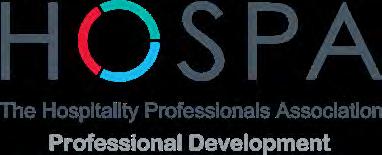
5 minute read
Hotel reopening strategy
by HOSPA
Start now with your re-opening plan
One of HOSPA’s founders & member Howard Field offers his tips for post-COVID-19 reopening.
Advertisement
An epidemic such as that we are now experiencing, requires that plans for re-opening build in assumptions that can be reviewed as the situation becomes clearer.
Unlike having set target dates for opening a new hotel, based on construction and fitting programmes that can be scheduled and tightly controlled, there are many external factors will govern the timing and outcomes of the re-opening plan.
Whether the hotel is owner operated, or is subject to the involvement of external stakeholders, will also affect the complexity of re-opening planning and budgeting.
Decisions by Government and other external authorities will influence when various elements of any plan for reopening can be activated.
Transport availability will determine when guests, suppliers and employees can gain access to the property.
Whether all the businesses providing goods and services to the hotel remain able to supply as required will determine whether alternative sources must be found. Suppliers will be concerned with their own solvency and may demand pre-payment or fast settlement to ensure continuity.
Organising bringing back staff who were laid off or furloughed, and recruiting and inducting new staff will be major tasks. When government schemes to support the retention of employees expire, the total costs of their pay will fall on the operator. This could result in the enforced layoff of staff not required while business levels recover.
In addition, special care will need to be taken over the physical and mental health of returning staff. They may need considerably more personal support while they re-adapt to the working environment.
Ensuring all the assets are secure and in good order, and setting up the property, equipment and M&E systems to be ready for operation, are essential before operations can re-commence.
The many IT, communication, safety and security systems, have to be recommissioned. This requires also checking that externally provided software and support services remain available.
Sales, marketing and public relations activities are all essential parts of planning for re-opening. Re-connecting with all sources of business and re-establishing contacts with agents and clients, including checking whether past contacts are still in place, will be of prime importance.
Setting up reservation and revenue management systems, and populating them with pre-existing data to enable preliminary forecasts to be made. Reinstating point of sale, front and back office and all financial accounting and control systems needs to be planned, allowing for staged practice and full operation.
Planning and practising to re-start all operational activities need to be phased depending on the availability of safe access and readiness of the property and systems.
Careful financial planning will be necessary to ensure that adequate working capital is available to support gearing up operations. Determining and costing staffing levels and planning purchasing of supplies and services for the period before revenues are generated and cash is received, are vital to ensure funds are available when required.
Reviewing all policies regarding deposits and prepayments during the initial period will be important. Credit checking and history will no longer be reliable. This includes payment terms with corporate clients, third parties, agents and others.
Equally, vendors to the hotel will also be concerned with their own solvency and may demand pre-payment or fast settlement to ensure continuity of supply.
There will be challenges handling all of these elements, and as well unique opportunities for management teams to re-think and implement creative and productive improvements.
Hotels will need to demonstrate to guests and staff even more than in the past that they provide physical comfort, security, clean and healthy environments, and they tick all of the sustainability boxes in their styles of operation. These will be far more important success factors in the future.
Re-Opening Plan Checklist
Key Questions to Answer:
Under whose c ontrol is the decision when to start re-opening? Who will authorise the pr ogramme and the key action steps? Who will hav e responsibility to coordinate and report on progress? Ho w often will the plan be reviewed and updated? Who will budget and control the costs? Ho w will the re-opening budget be funded?
Task List Content
Set a best outcome target date for the re-opening phases and base the planning on this, subject to a regular update. Establish policies that will apply during the re-opening period, including credit terms, purchasing and payment term, emplo yee pay and benefits. Plan property preparation; recommissioning of all building management systems; restart contracts; reinstate security and CCTV systems; carry out health and vermin checks. Check all physical assets; FF&E placement for re-starting operations. Pr ogramme systems re-start for all property management, HR, guest and POS, hotel accounting, marketing and reporting systems. Plan re-opening staffing; re-c ommence recruitment; organise on-boarding of furloughed and new employees. Schedule restarting of F&B purchasing and supply netw ork. Programme all consumable supplies, utilities etc. Staged plan for operational re-opening for each department and outlet. Pr ogramme Marketing and P&R throughout and including the re-launch. Ensure external authorities advised as necessary; check licences, permits. Prepare a cash forecast for the period and a plan for pr ovision of the required working capital.
Against each of the above, allocate responsibilities, and the minimum timing required. There are many tools to aid project planning, most of which are based on the Gantt model.
STILL ENROLLING



Study with us on our flexible online programmes in Hospitality Finance

The HOSPA Financial Management and Accounting programme is the only online course of its kind providing finance managers in hotels, restaurants and leisure with an industry specific in-depth programme of study.
The course is focused on the requirements of the sector combining best practice from the Uniform System of Accounts for the Lodging Industry with statutory accounting. Studying with us:
Is very easy - all the materials are online and you receive expert tutor support Develops the skills and knowledge to manage a hospitality finance department Gives exemption from the CIMA Certificate in Business Accounting, Papers 1 & 2 Leads to HOSPA Associate (Cert Finance) membership of HOSPA on completion Is convenient and relevant to your career in hospitality finance Costs just £820 + VAT per stage
All courses are endorsed by the Institute of Hospitality.






